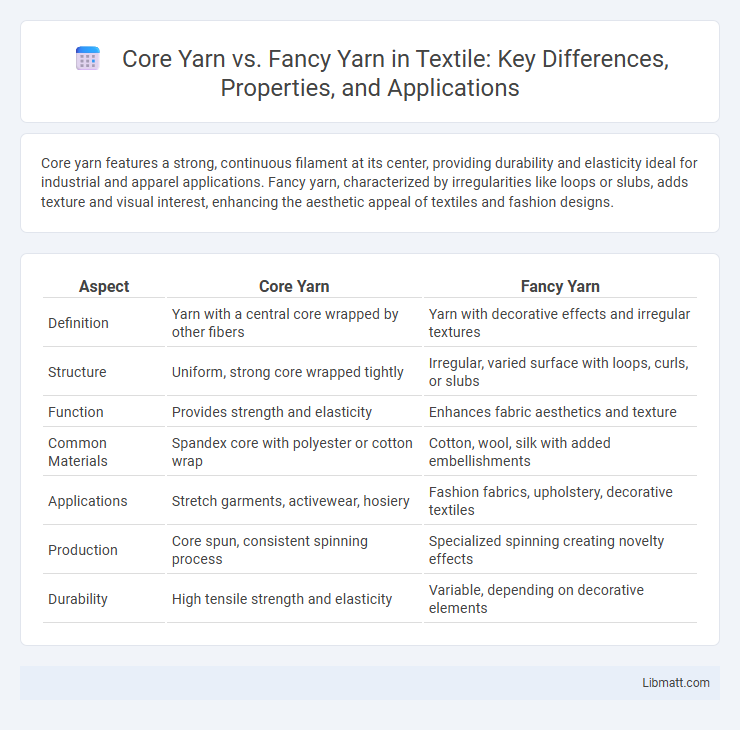Core yarn features a strong, continuous filament at its center, providing durability and elasticity ideal for industrial and apparel applications. Fancy yarn, characterized by irregularities like loops or slubs, adds texture and visual interest, enhancing the aesthetic appeal of textiles and fashion designs.
Table of Comparison
| Aspect | Core Yarn | Fancy Yarn |
|---|---|---|
| Definition | Yarn with a central core wrapped by other fibers | Yarn with decorative effects and irregular textures |
| Structure | Uniform, strong core wrapped tightly | Irregular, varied surface with loops, curls, or slubs |
| Function | Provides strength and elasticity | Enhances fabric aesthetics and texture |
| Common Materials | Spandex core with polyester or cotton wrap | Cotton, wool, silk with added embellishments |
| Applications | Stretch garments, activewear, hosiery | Fashion fabrics, upholstery, decorative textiles |
| Production | Core spun, consistent spinning process | Specialized spinning creating novelty effects |
| Durability | High tensile strength and elasticity | Variable, depending on decorative elements |
Introduction to Core Yarn and Fancy Yarn
Core yarn consists of a central filament, often made of synthetic fibers like spandex, wrapped with other fibers to provide stretch, strength, and flexibility in textiles. Fancy yarns, characterized by their unique textures, colors, and irregular patterns, are crafted to enhance fabric aesthetics and tactile appeal through techniques such as twisting, knotting, or looping. Understanding the distinct roles of core yarns in functionality and fancy yarns in decorative effects is essential for textile design and manufacturing.
Defining Core Yarn: Characteristics and Uses
Core yarn consists of a strong central filament, typically made of synthetic fibers like polyester or nylon, wrapped by softer fibers such as cotton or wool to enhance texture and durability. This construction provides exceptional elasticity, strength, and resistance to abrasion, making core yarn ideal for applications like activewear, hosiery, and upholstery. The combination of a high-tensile filament core with natural fiber wrapping improves both performance and comfort in textile products.
Understanding Fancy Yarn: Types and Features
Fancy yarn showcases unique textures and vibrant colors produced by combining various fibers, twists, and techniques such as boucle, slub, and eyelash yarns. These yarns enhance fabric aesthetics with irregularities and decorative effects ideal for fashion and upholstery. Your choice of fancy yarn can significantly impact the visual appeal and tactile experience of the final textile.
Key Differences Between Core Yarn and Fancy Yarn
Core yarn consists of a central elastic or synthetic filament wrapped with natural or synthetic fibers, providing strength and stretch, while fancy yarn features textured, looped, or irregular surfaces designed primarily for aesthetic effects. Core yarns are typically used in activewear and performance textiles for durability and flexibility, whereas fancy yarns enhance fashion and decorative fabrics with unique visual and tactile appeal. Your choice depends on whether functionality or decorative appeal is the primary requirement in your textile application.
Manufacturing Processes: Core Yarn vs Fancy Yarn
Core yarn manufacturing involves a central filament, typically synthetic, wrapped with spun yarn to enhance strength and elasticity, resulting in consistent and durable fabric performance. Fancy yarn production incorporates multiple techniques such as twisting, knotting, or looping to create textured or decorative effects, often using mixed fibers for aesthetic appeal. Your choice between core and fancy yarns impacts the fabric's functionality and design complexity based on their distinct manufacturing processes.
Application Areas: Where Each Yarn Shines
Core yarn excels in applications requiring enhanced strength and elasticity, such as activewear, industrial textiles, and performance fabrics, providing durability and stretch. Fancy yarns find their niche in fashion, upholstery, and decorative textiles, where unique textures, colors, and patterns add visual appeal and design interest. Your choice between core and fancy yarn depends on whether functionality or aesthetic impact is the priority in the final product.
Performance and Durability Comparison
Core yarn features a strong central filament surrounded by staple fibers, enhancing tensile strength and resistance to abrasion, making it highly durable for heavy-duty applications. Fancy yarn incorporates textured or novelty fibers, prioritizing aesthetic appeal over structural integrity, which can reduce overall yarn performance and lifespan under stress. In terms of durability, core yarn excels in maintaining fabric strength and longevity, while fancy yarns are more suited for decorative purposes with moderate durability.
Aesthetic and Functional Impacts
Core yarn enhances fabric durability and stretch by incorporating a strong synthetic filament, making it ideal for activewear and performance textiles. Fancy yarns contribute unique textures, colors, and patterns through techniques such as twisting, looping, or adding slubs, significantly elevating the visual appeal and tactile experience of your garments. Combining both yarn types can optimize aesthetic creativity while maintaining essential functional properties in textile design.
Market Trends and Consumer Preferences
Core yarns, renowned for their strength and elasticity, dominate sectors requiring durability such as activewear and industrial textiles, with market trends showing consistent growth driven by advancements in fiber technology. Fancy yarns, characterized by decorative textures and vibrant patterns, appeal primarily to fashion and home decor industries where consumer preferences favor uniqueness and aesthetic appeal, fueling demand for artisanal and premium products. Current consumer shifts highlight an increasing inclination towards sustainability and innovation, prompting manufacturers to blend core yarn resilience with fancy yarn creativity to meet evolving market expectations.
Choosing the Right Yarn for Your Projects
Core yarn offers durability and strength with a consistent texture, making it ideal for sturdy fabrics and everyday wear. Fancy yarn provides decorative effects through unique textures, colors, and patterns, suitable for fashion-forward or accent pieces. Selecting the right yarn depends on the project's purpose, desired aesthetic, and fabric performance requirements.
Core yarn vs Fancy yarn Infographic

 libmatt.com
libmatt.com